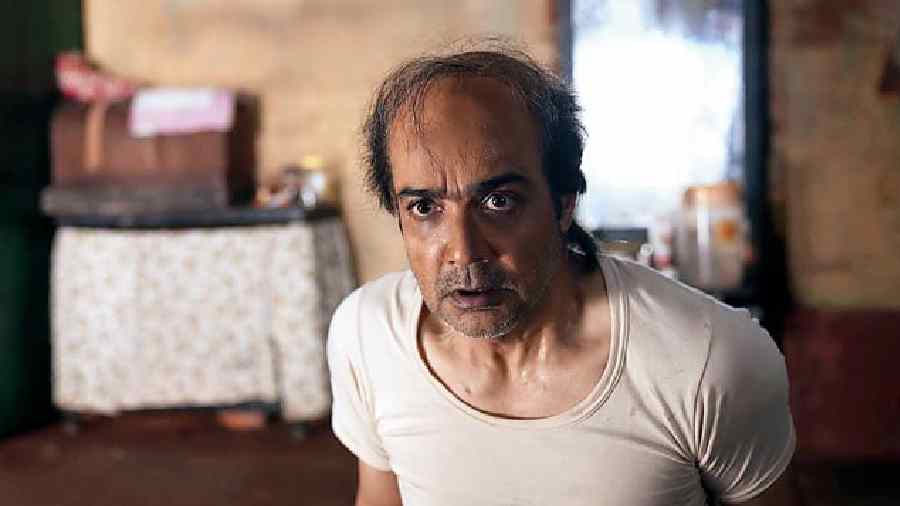Is film a reflection of life or is it fictionalised life? Does it project life or does life follow a film’s projections? Age-old questions that came to the fore once again while watching the latest Prosenjit starrer Aay Khuku Aay. The film evokes not just questions, but feelings and emotions too. Sauvik Kundu, the maker who presented us with a film on urban middle-class aspirations, Switzerland with considerable success, has now made a film on a burning issue that plagues our society both in urban and rural sectors.
Aay Khuku Aay is a multi-layered film that deals on one hand with a father-daughter relationship and on the other, the traps that a teenager is faced with.
Problems of survival, the dreams of a man with a passion for acting, a girl’s unfulfilled desires and a multitude of other problems that ordinary people face in their daily lives. Yet, it is not just about listing out miseries, it has a silver lining too. Through personal tragedy of one, universal truth dawns on others. The good and the bad co-exist, but it is the good that triumphs, of course with dents and injuries to some.
Sauvik Kundu’s story is well researched and he has very cleverly used a Prosenjit lookalike’s life as his starting point. As a lookalike, Nirmal Mondal ekes out an existence through presenting Prosenjit Chatterjee hit numbers on stage in various rural functions.
This is a common occurrence in rural Bengal. A whole lot of singers and actors make a living through imitations of stars. ‘Teko Prosenjit’ has an associate, a blind friend who performs with him on stage dressed as his feminine partner. Khuku, the teenage daughter of the former, is loved by both. Though physically blind, Andho Gossain (Shankar Debnath) sees a lot more than perhaps Teko Prosen.
The highlight of Teko Prosen’s life is when he meets his idol, the star Prosenjit at a function.
Both roles played by Prosenjit Chatterjee proves once again how he has matured into a multifaceted actor from the dancing, fighting, cavorting star of yesteryears. His passion for experimenting with look and presentation is admirable. Somnath Kundu’s make-up does wonders in characterisation.
As Khuku, Nirmal’s teenage daughter, Ditipriya does a total volte face from her popular Rani Rashmoni image a la television. She plays her age with natural ease, that perhaps comes from a skill honed through an amalgamation of practice and perseverance.
The pitfalls that young girls are faced with need to be put forth and Sauvik has presented it through the film.
The desire of a motherless teenager to become a dancer, the father’s attempts at protecting his daughter by denying permission, the daughter’s subterfuge and ultimate falling into wrong company is a regular story that one reads about in newspapers or hears on television. It is but natural that teenage is the time for dreams and love.
It is the time for building a future both career-wise and emotionally. Guidance in the right spirit is needed. And the concept of that ‘spirit’ of what is thought of as right and what actually is right has been dealt with by the film-maker in detail in Aay Khuku Aay.
Sauvik has unfolded the mundane life gently at first and then mixed it with the excitement, emotions, romance, tragedy and ultimate triumph. The film’s pace or the high-voltage drama at points may seem jarring, but as an afterthought one realises that the audience does need to be jolted when reality is being presented. And that was what Sauvik has done.
The small nuances of relationships, friendships and romance have been delineated through a skilled presentation.
A young girl’s penchant for a bike-riding young man rather than a staid nerdy dependable suitor presented by her father is a regular story. What happens to her through her attraction and simple desires, though tragic, is a truth that needs to be told and Sauvik has done so with elan and unabashed courage and truthfulness.
The film has its lighter moments where Nirmal attempts to be an ideal father much to his daughter’s exasperation. The father-daughter relationship has the right dose of sentiment and misconceived good intentions intertwined.
Mithila, as the wife and Khuku’s mom, is eloquent in her silence. The insensitivity of humour that tantamounts to cruelty has been presented by Sauvik elaborately, despite the threat of earning the epithet ‘didactic’.
The political angle presented through the lady leader Putul Rani, played by Sohini Sengupta, has a mixture of the grotesque and the comic that veils a hidden streak of villainy. The characterisation might seem over the top at points but Sohini, a master actress, has managed to provide balance that prevents Putul Rani from becoming a mere caricature. Actors Satyam Bhattacharya and Rahul Dev Bose as the two young men at two ends of a spectrum were extremely believable in their presentation. In fact, Rahul’s charm had the audience, including yours truly, eating out of his hands.
Sauvik’s concept and basic story was elaborated upon by Sugata Sinha as he wrote a script that presented a slice of life amongst the less fortunate. The presentation of this through the lens of Indraneel Mukherjee is at times dark, brooding, menacing and at others soft, lilting, romantic and sentimental. The subtleties of light and shade bring out the right mood as do the actors’ performances. The production designer Krishnendu Karar seems to have worked hand in hand with the maker and the lensman. The settings of each character, the rural stage, greenroom, the fairground, has the right touch of shabbiness and garish brightness.
Sauvik’s use of old Prosenjit hits evokes nostalgia, and Chirodini tumi je aamar proves once more to be the signature number that represents the star Prosenjit. Created by Bappi Lahiri for Prosenjit’s superhit film Amar Shangi in the 1980s, the prelude to this song heralds the arrival of Prosenjit and Sauvik has used it to the hilt. The background score by Debojyoti Mishra stands out as a highlight of the film.
There are thousands of Khukus all over Bengal, if not the entire country. Teenage is the time when a new life, new emotions, new stirrings within the heart, mind and body seem to confuse individuals. A confusion that has increased manifold as life today provides more and more allures and attractions. Be it a bike or mobile, education or independence, rights and aspirations, Aay Khuku Aay elaborates on these issues and presents a picture where truth and fiction intermingle.

Sudeshna Roy is an Indian film director, actor and writer based in Tollywood
